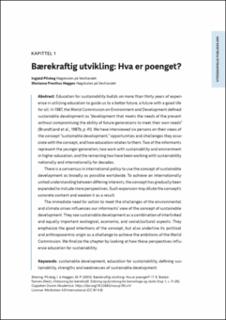Bærekraftig utvikling: Hva er poenget?
Chapter, Peer reviewed
Published version
Permanent lenke
https://hdl.handle.net/11250/3122162Utgivelsesdato
2023Metadata
Vis full innførselSamlinger
- Import fra CRIStin [3604]
- Institutt for idrett, kosthald og naturfag [1006]
Originalversjon
10.23865/noasp.193.ch1Sammendrag
Education for sustainability builds on more than thirty years of experience in utilizing education to guide us to a better future, a future with a good life for all. In 1987, the World Commission on Environment and Development defined sustainable development as “development that meets the needs of the present without compromising the ability of future generations to meet their own needs” (Brundtland et al., 1987b, p. 41). We have interviewed six persons on their views of the concept “sustainable development,” opportunities and challenges they associate with the concept, and how education relates to them. Two of the informants represent the younger generation, two work with sustainability and environment in higher education, and the remaining two have been working with sustainability nationally and internationally for decades.
There is a consensus in international policy to use the concept of sustainable development as broadly as possible worldwide. To achieve an internationally united understanding between differing interests, the concept has gradually been expanded to include more perspectives. Such expansion may dilute the concept’s concrete content and weaken it as a result.
The immediate need for action to meet the challenges of the environmental and climate crises influences our informants’ view of the concept of sustainable development. They see sustainable development as a combination of interlinked and equally important ecological, economic, and social/cultural aspects. They emphasize the good intentions of the concept, but also underline its political and anthropocentric origin as a challenge to achieve the ambitions of the World Commission. We finalize the chapter by looking at how these perspectives influence education for sustainability.

